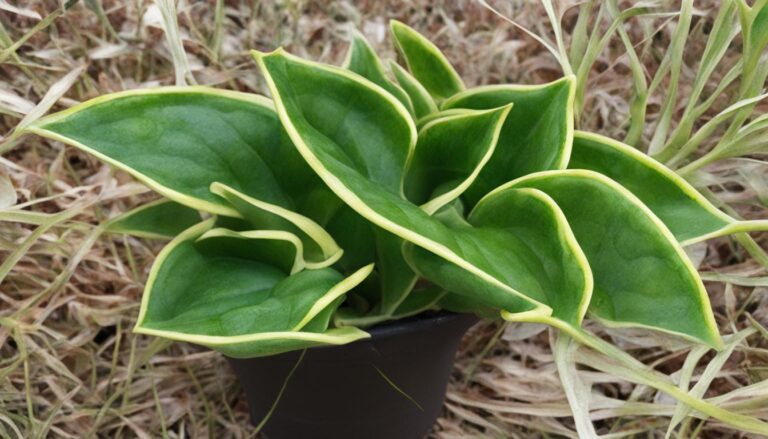
The skin is the largest organ in the body and plays a crucial role in protecting us from external elements. While there are many over-the-counter skincare products available, natural herbs can also be effective in maintaining healthy skin.
In this article, I will explore the best herbs for skin care and how to incorporate them into your skincare routine.
Key Takeaways:
- Choosing the right medicinal plants can provide natural and effective solutions for skin care.
- Herbs such as aloe vera, oat straw, and basil have beneficial properties for the skin.
- Using herbs in various forms like gels, oils, or infusions can enhance your skincare routine.
- Consider growing your own medicinal plants for a ready supply of skincare ingredients.
- Consulting with professionals can help you select the best herbs and skincare products for your specific needs.
What are Herbs and Their Uses?
Herbs are versatile plants that can serve various purposes in our lives. They can be classified into culinary herbs, medicinal herbs, and tonic herbs, each with its own unique uses and benefits.
Culinary herbs are commonly used to add flavor to our dishes and enhance the taste of our food. Examples of culinary herbs include basil, rosemary, thyme, and sage. These herbs not only provide delicious flavors but also have digestive benefits that promote healthy digestion.
Medicinal herbs, on the other hand, have been used for centuries to treat diseases and promote overall well-being. Popular medicinal herbs include chamomile, lavender, ginger, and echinacea. These herbs possess various healing properties and can be used in the form of teas, infusions, or tinctures to address specific health concerns.
Tonic herbs are another category of herbs that are safe to consume in larger doses and have a tonifying effect on the body. These herbs, such as ginseng, ashwagandha, and rhodiola, are known for their adaptogenic properties, which help the body adapt to stress and promote overall vitality.
What are Herbs and Their Uses?
| Category | Examples | Uses |
|---|---|---|
| Culinary Herbs | Basil, Rosemary, Thyme, Sage | Flavoring food, promoting healthy digestion |
| Medicinal Herbs | Chamomile, Lavender, Ginger, Echinacea | Treating diseases, promoting well-being |
| Tonic Herbs | Ginseng, Ashwagandha, Rhodiola | Adaptogenic properties, promoting vitality |
By understanding the different types of herbs and their uses, we can incorporate them into our daily lives for both culinary enjoyment and overall health benefits. Whether it’s adding fresh basil to our pasta dishes or brewing a cup of chamomile tea for relaxation, herbs have the power to enhance our well-being in various ways.
Skincare Benefits of Herbs
When it comes to skincare, herbs can be incredibly beneficial. Their natural properties can promote healthy skin, clear acne, repair damaged tissue, and combat signs of aging.
Topically applied, these herbs have antibacterial properties, soothe inflammation, and provide nourishment to the skin. Using herbs in the form of herbal oils can enhance their skincare benefits.
Nourishing and Soothing Effects
Certain herbs have nourishing and soothing effects on the skin. For example, chamomile is known for its calming properties and can help soothe irritated skin. Lavender has antioxidant and antimicrobial properties, making it beneficial for acne-prone skin. Rosemary is rich in antioxidants and can promote a youthful complexion.
Antibacterial and Anti-Inflammatory Properties
Many herbs have antibacterial and anti-inflammatory properties, which can be particularly helpful for individuals with sensitive or acne-prone skin. Tea tree oil, for example, is well-known for its antibacterial properties and can effectively treat acne.
Aloe vera has soothing and healing properties, making it effective in reducing redness and inflammation. Calendula is another herb that has anti-inflammatory properties and can help soothe irritated skin.
Nourishment and Hydration
Some herbs are rich in essential nutrients and can provide nourishment and hydration to the skin. For instance, jojoba oil is similar in composition to the skin’s natural sebum, making it an excellent moisturizer.
Coconut oil can penetrate deeply into the skin, providing hydration and improving skin elasticity. The use of these herbs can help achieve a healthy and radiant complexion.
| Herb | Skincare Benefit |
|---|---|
| Chamomile | Calming and soothing properties |
| Lavender | Antioxidant and antimicrobial properties |
| Rosemary | Rich in antioxidants for a youthful complexion |
| Tea Tree Oil | Antibacterial properties for acne treatment |
| Aloe Vera | Soothing and healing properties for reducing inflammation |
| Calendula | Anti-inflammatory properties for soothing irritated skin |
| Jojoba Oil | Moisturizing and nourishing properties |
| Coconut Oil | Deep hydration and improved skin elasticity |
Best Herbs for Skin Care
When it comes to taking care of your skin naturally, incorporating herbs into your skincare routine can provide numerous benefits. Here are some of the best herbs for skin care:
Aloe Vera

Tips for Herbal Gardening
If you are new to herbal gardening, here are some additional tips to make the process smoother:
- Start with easy-to-grow herbs: Some herbs, like mint and rosemary, are relatively low-maintenance and ideal for beginners.
- Research individual herbs: Each herb has specific requirements and uses. Take the time to understand the needs of each herb you are growing to ensure their optimal growth.
- Consider companion planting: Some herbs, when grown together, can enhance each other’s growth and repel pests. For example, planting basil near tomatoes can improve the tomatoes’ flavor and deter pests.
- Regularly monitor and maintain your plants: Check for pests, diseases, and signs of nutrient deficiencies. Prune or trim the plants as needed to promote healthy growth.
- Label your plants: Use plant markers or labels to keep track of the different herbs you are growing. This will help you identify and harvest them correctly.
Harvesting Calendar
| Herb | Part to Harvest | Best Time to Harvest |
|---|---|---|
| Chamomile | Flowers | When fully open, in the morning |
| Lavender | Flowers | When the buds are just starting to open |
| Mint | Leaves and stems | Before flowering |
| Rosemary | Leaves | Throughout the growing season |
By following these tips and incorporating herbal gardening into your routine, you can enjoy the benefits of freshly harvested herbs for your skin care needs. Remember to always research the specific requirements of each herb and consult a professional if you have any concerns.
Precautions and Considerations
When using herbs for skincare, it’s important to be aware of certain precautions and considerations to ensure your safety and maximize the benefits. While herbs are generally safe, some individuals may have allergies or sensitivities to specific herbs.
It’s recommended to perform a patch test before applying any herbal products to your skin. Apply a small amount of the product to a small area of your skin and wait for 24 hours to check for any adverse reactions.
In addition, it’s crucial to use herbs in the recommended doses and follow the instructions for topical use. Using excessive amounts of certain herbs or using them incorrectly may lead to skin irritation or other undesired effects.
Always consult reliable sources or seek professional advice from healthcare professionals or dermatologists if you have any concerns or specific medical conditions.
Furthermore, it’s essential to source your herbs from reputable suppliers to ensure their quality and purity. Avoid using herbs that have been exposed to contaminants or have expired.
Proper storage of herbs is also necessary to maintain their potency and effectiveness. Store herbs in airtight containers in a cool, dry place away from direct sunlight.
Allergies to Herbs
While herbs offer numerous skincare benefits, it’s crucial to be aware of potential allergies. Some common herbs that may cause allergic reactions in sensitive individuals include chamomile, lavender, and rosemary. If you experience any itching, redness, or swelling after using a particular herb, discontinue use and consult a healthcare professional.
| Herb | Benefits | Precautions |
|---|---|---|
| Aloe Vera | Moisturizing and healing properties | Avoid using if you have a known allergy to lilies or garlic |
| Calendula | Anti-inflammatory and healing properties | May cause allergic reactions in individuals with Ragweed allergy |
| Basil | Antiseptic properties, treats skin conditions | May cause skin irritation in some individuals |
By being mindful of these precautions and considerations, you can safely and effectively incorporate herbs into your skincare routine. Remember to start with a patch test, follow recommended doses and instructions, and consult professionals when needed. With proper care, herbal skincare can provide nourishment and enhance the health and appearance of your skin.
Healthy Habits for Skin Care
When it comes to achieving and maintaining healthy skin, it’s important to go beyond just skincare products. Incorporating healthy habits into your daily routine can have a significant impact on the overall health and appearance of your skin. By embracing a holistic approach to skincare, you can promote long-term skin health and radiance. Here are some essential healthy habits to consider:
- Hydration: Drinking an adequate amount of water is crucial for hydrating your skin from within. Aim to drink at least 8 glasses of water per day to keep your skin moisturized and supple.
- Proper Nutrition: A balanced diet rich in fruits, vegetables, and whole grains can provide essential nutrients that are beneficial for your skin. Include foods that are high in antioxidants, such as berries and leafy greens, to protect your skin from free radical damage.
- Regular Exercise: Engaging in regular physical activity not only improves your overall health but also increases blood flow to the skin, promoting a healthy complexion. Aim for at least 30 minutes of exercise most days of the week.
- Stress Management: Chronic stress can negatively impact your skin by triggering inflammation and breakouts. Practice stress management techniques such as meditation, deep breathing exercises, and yoga to promote skin health and relaxation.
- Adequate Sleep: Getting enough sleep is crucial for the regeneration and repair of your skin cells. Aim for 7-9 hours of quality sleep each night to wake up with refreshed and rejuvenated skin.
By incorporating these healthy habits into your daily routine, you can support the natural healing and rejuvenation processes of your skin. Remember, skincare is not just about external products, but also about nurturing your skin from the inside out.

Healthy habits are an integral part of a holistic approach to skincare. By staying hydrated, eating a balanced diet, exercising regularly, managing stress, and getting enough sleep, you can promote healthy and radiant skin. Remember to nurture your skin from the inside out by incorporating these habits into your daily routine.
Combining Natural and Conventional Skincare
When it comes to skincare, there is often a debate between natural remedies and conventional skincare products. Both approaches have their own benefits, and the good news is that you don’t have to choose one over the other. By integrating natural herbs and trusted conventional products, you can create a skincare routine that is customized to your needs and preferences.
Natural remedies, such as herbs, provide a holistic approach to skincare. They are often derived from plants and contain beneficial compounds that can nourish and improve the health of your skin.
For example, aloe vera is known for its moisturizing properties, while chamomile has soothing effects on the skin. These natural remedies can be used in various forms, such as herbal oils or homemade masks, to address specific skin concerns.
On the other hand, conventional skincare products are formulated with scientifically-proven ingredients that target specific skin issues. These products are often backed by extensive research and undergo rigorous testing to ensure their safety and efficacy.
They can be easily incorporated into your skincare routine and provide immediate results. For example, if you are struggling with acne, a dermatologist-recommended benzoyl peroxide or salicylic acid product may be more effective than herbal remedies alone.
By combining natural and conventional skincare, you can take advantage of the best of both worlds. You can use natural remedies to nourish and maintain the overall health of your skin, while incorporating conventional products to target specific concerns.
The key is to find the right balance that works for your skin type and concerns. Consulting with a skincare professional or dermatologist can help you determine which natural herbs and conventional products are best suited for your needs.
Comparison of Natural and Conventional Skincare
| Aspect | Natural Skincare | Conventional Skincare |
|---|---|---|
| Source | Derived from plants and natural ingredients | Synthetic and laboratory-developed ingredients |
| Approach | Focuses on holistic and nourishing effects | Targets specific skin concerns |
| Efficacy | Gentle and gradual results | Immediate and targeted results |
| Safety | Minimal risk of adverse reactions | Rigorously tested for safety and efficacy |
| Availability | Can be easily made at home or purchased from natural skincare brands | Widely available in drugstores and skincare specialty stores |
| Customization | Can be tailored to individual needs and concerns | Offers a wide range of products for different skin types and concerns |
When integrating natural and conventional skincare, it’s important to patch test new products to assess compatibility and minimize the risk of adverse reactions. It’s also essential to follow the recommended usage instructions for both natural remedies and conventional products.
Remember, what works for one person may not work for another, so it’s crucial to listen to your skin and make adjustments accordingly. By combining the power of nature and science, you can create a skincare routine that is effective, personalized, and enjoyable.
Consultation and Professional Advice
When it comes to your skin, it’s always a good idea to seek professional advice. Consulting with a dermatologist or skincare professional can provide valuable insights and personalized recommendations for your specific needs.
Whether you have specific skin concerns or you simply want expert guidance in choosing the right skincare products, these professionals are equipped with the knowledge and expertise to help.
A skincare consultation with a dermatologist can help identify any underlying skin conditions or concerns that may require medical intervention.
They can assess your skin type, analyze your specific concerns, and recommend treatments or skincare routines tailored to your needs. By addressing the root causes of your skin issues, a dermatologist can provide targeted solutions for lasting results.
Professional skincare advice is especially essential if:
- You have persistent acne or other skin conditions that do not improve with over-the-counter products.
- You have sensitive skin or a history of allergies, and you need guidance on suitable products and ingredients.
- You are unsure about the best skincare routine for your skin type and concerns.
- You want to incorporate herbal remedies or natural ingredients into your skincare routine and need guidance on their efficacy and potential interactions with other products.
By consulting with skincare professionals, you can ensure that you are making informed decisions about your skincare regimen. They can offer valuable advice on product selection, ingredient compatibility, and the most effective methods for achieving your desired results.
| Dermatologist Consultation Benefits |
|---|
| Targeted solutions for specific skin concerns |
| Identification of underlying skin conditions |
| Expert guidance on suitable products and ingredients |
| Personalized skincare routines tailored to your needs |
| Access to the latest advancements in dermatology |
Remember, your skin is unique, and what works for one person may not work for another. Investing in professional skincare advice can save you time, money, and frustration in finding the right products and routines for your skin. Whether you’re dealing with acne, aging skin, or just want to maintain a healthy complexion, the expertise of a skincare professional can make a world of difference.
Incorporating medicinal plants into your skincare routine can provide a natural and effective way to promote healthy skin. From aloe vera to chamomile, there are various herbs that offer specific benefits for different skin concerns.
Aloe vera’s moisturizing and healing properties can help soothe and rejuvenate the skin, while chamomile’s anti-inflammatory effects can calm and balance the complexion.
By considering the growing and harvesting of these herbs, you can have a sustainable and readily available supply for your skincare needs.
Whether you have a garden or a few pots, cultivating medicinal plants can add a personal touch to your skincare routine. Proper harvesting and storage techniques will ensure that the herbs retain their beneficial properties.
Combining natural remedies with conventional skincare products allows you to customize your regimen based on your individual needs. While herbs can provide numerous benefits, it’s important to take precautions and consider any potential allergies or sensitivities. Doing a patch test and consulting with a healthcare professional can help ensure you use herbs safely.
Remember, skincare is not just about external products. Incorporating healthy habits like drinking water, exercising, managing stress, and getting enough sleep can further enhance the health of your skin. By taking a holistic approach to skincare and seeking professional advice when needed, you can achieve radiant and healthy skin.
FAQ
Which medicinal plants are safe for skin care?
Some safe medicinal plants for skin care include aloe vera, oat straw, basil, horsetail, and calendula. However, it’s important to do a patch test and consult with a healthcare professional if you have any concerns or allergies.
What are herbs and their uses?
Herbs are flowers, leaves, or plants that can be used for culinary or medicinal purposes. Culinary herbs are used for flavoring food, while medicinal herbs are used for treating diseases and promoting overall health. Tonic herbs are safe to consume in large doses and can have various benefits, including promoting skin health.
What are the skincare benefits of herbs?
Herbs can promote radiant and healthy skin, clear acne, repair damaged skin tissues, and combat signs of aging. When applied topically, they can have antibacterial properties, soothe inflammation, and provide nourishment to the skin.
What are the best herbs for skin care?
Some of the best herbs for skin care include aloe vera, oat straw, basil, horsetail, and calendula. These herbs have moisturizing, healing, and anti-inflammatory properties that can benefit the skin.
How can I use herbs in my skincare routine?
You can use herbs in various forms such as aloe vera gel, oat straw as a face wash or added to oils, topical use of basil for skin conditions, and infusing calendula and horsetail into oils or baths. Herbal oils can also be used to moisturize and nourish the skin.
Are there other medicinal plants for skin care?
Yes, there are other medicinal plants that are beneficial for skin care such as rose hips, chickweed, and nettles. These plants have specific properties that can address various skin concerns.
How can I grow and harvest medicinal plants for skin care?
Medicinal plants can be grown in gardens or pots with proper sunlight, well-drained soil, and regular watering. Some herbs like chamomile and lavender thrive in sunny or partially shaded areas. It’s important to learn how to properly harvest and store herbs to retain their beneficial properties.
What precautions and considerations should I take when using herbs for skincare?
It’s important to do a patch test before applying herbs to the skin to check for any allergies. Follow recommended doses and instructions for topical use. If you have specific medical conditions, it’s best to consult with a healthcare professional.
What are some healthy habits for skin care?
Drinking plenty of water, exercising regularly, practicing stress management techniques, and getting enough sleep can contribute to healthier skin. Skincare is not just about external products but also about overall wellness.
Can I combine natural and conventional skincare?
Yes, you can integrate natural herbs into your skincare routine while also using trusted conventional products. This allows you to customize your skincare regimen based on individual needs and preferences.
Do I need professional advice for my skincare?
It’s always a good idea to seek professional advice if you have specific skin concerns or conditions. Dermatologists and skincare professionals can provide personalized recommendations based on your skin type, concerns, and medical history.
What is the conclusion of using medicinal plants for skin care?
By incorporating medicinal plants into your skincare routine, you can provide a natural and effective way to promote healthy skin. From aloe vera to chamomile, various herbs offer specific benefits for different skin concerns. Remember to consult with professionals for personalized advice.







One Comment
Comments are closed.